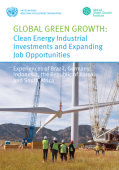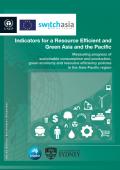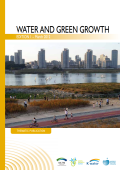Placing Indonesia’s economy onto a green and sustainable development pathway, as envisaged in the National Long Term Development Plan, will require a large mobilization of investment. Estimates of the annual investment needed are in the order of US$300‐530 billion, with a large portion of this investment needed in critical infrastructure, as well as environmentally sensitive areas such as agriculture, forestry, energy, mining and waste. In addition, financing for SMEs and industry is critical for creating jobs and boosting productivity.
To date, there is still limited understanding of the broad landscape of private green finance in Indonesia. While some research has been conducted on sustainable financing in the banking sector, there has been relatively little systematic research into the specific features and flows of green finance from private capital markets, even though Indonesia has reasonably sophisticated financial institutions and markets. This study is therefore intended to contribute to the exploration of the state of green investment in Indonesia within the wider economic and financial sector context.

This report examines the specific industrial policy measures promoting a low-carbon transition in five focus countries, specifically Brazil, Germany, Indonesia, the Republic of Korea and South Africa, through a compilation of expert review studies. It shows that across all levels of development, major attention is being paid to the threats of climate change and opportunities of pursuing a low-carbon development path, and dedicated efforts are presented to operate efficient industrial policies to enhance green growth. However, it is clear that the major focus in developing countries will need to be on green investments and on creating an enabling environment for such investments if the global economy is to effectively combat climate change.
This report is the second volume in a two volume set. Volume I of the report, providing overall findings from the project, can be accessed here.

Natural resources are the foundation of economic development. This report reveals the patterns and the evolution of natural resource use with 118 indicators in 26 countries of the Asia and the Pacific region over the last 40 years. The analysis shows that resource use in the region is both inefficient and unsustainable. The Asia-Pacific region will not be able to base its future economic growth on declining costs of natural resources as was possible during most of the twentieth century. An increasing reliance on resources from abroad and volatility in the global resource markets will pose challenges to the economic resilience of countries in the region. In this new economic context resource efficiency and decoupling of economic growth and resource use will be fundamental to the economic success of the region. The knowledge generated by this report helps to improve the understanding of the natural resource use and emissions consequences of economic growth in Asia and the Pacific to support policy formulation, monitoring and policy evaluation in the countries of the region.
Indonesia’s desire to drive economic growth and reduce climate risk is reflected in the sweeping policy reforms it has introduced in recent years to meet targets announced in 2009 to reduce greenhouse gas emissions. In this report, CPI identifies which public actors are investing in Indonesia, through which instruments, and what they are investing in to provide a baseline against which to measure progress and plan scale up. The landscape reveals investment patterns that allow decision makers to pinpoint where the biggest barriers and opportunities are.

This report is the first major output of a project on Water and Green Growth, led by the Government of the Republic of Korea and the World Water Council (WWC). It is the result of over 12 months of research and analysis by an international group of experts. It provides an analysis of 26 case studies that illustrate various aspects of water and green growth, and then uses the analysis to recommend a draft framework for policymakers.
